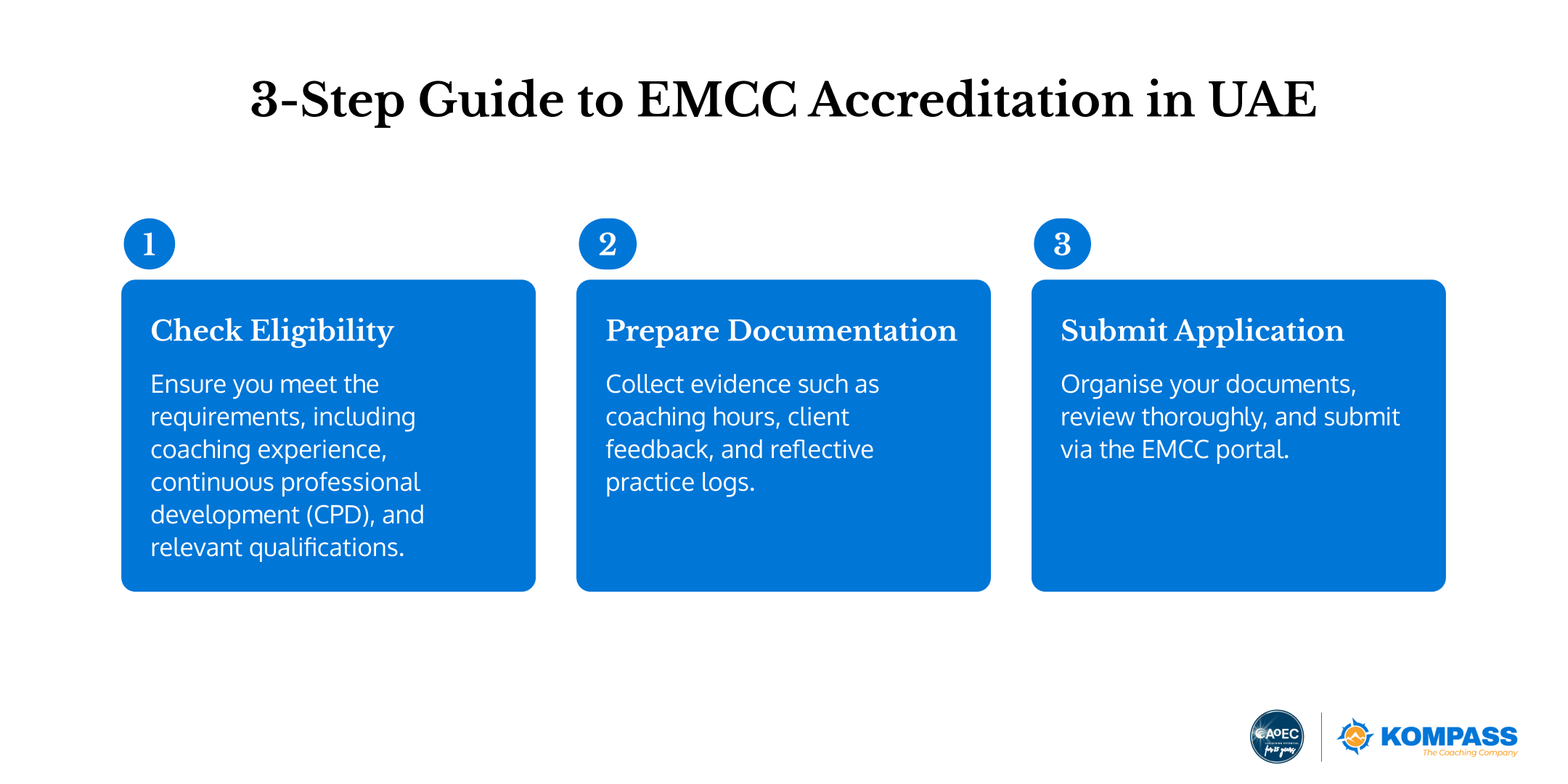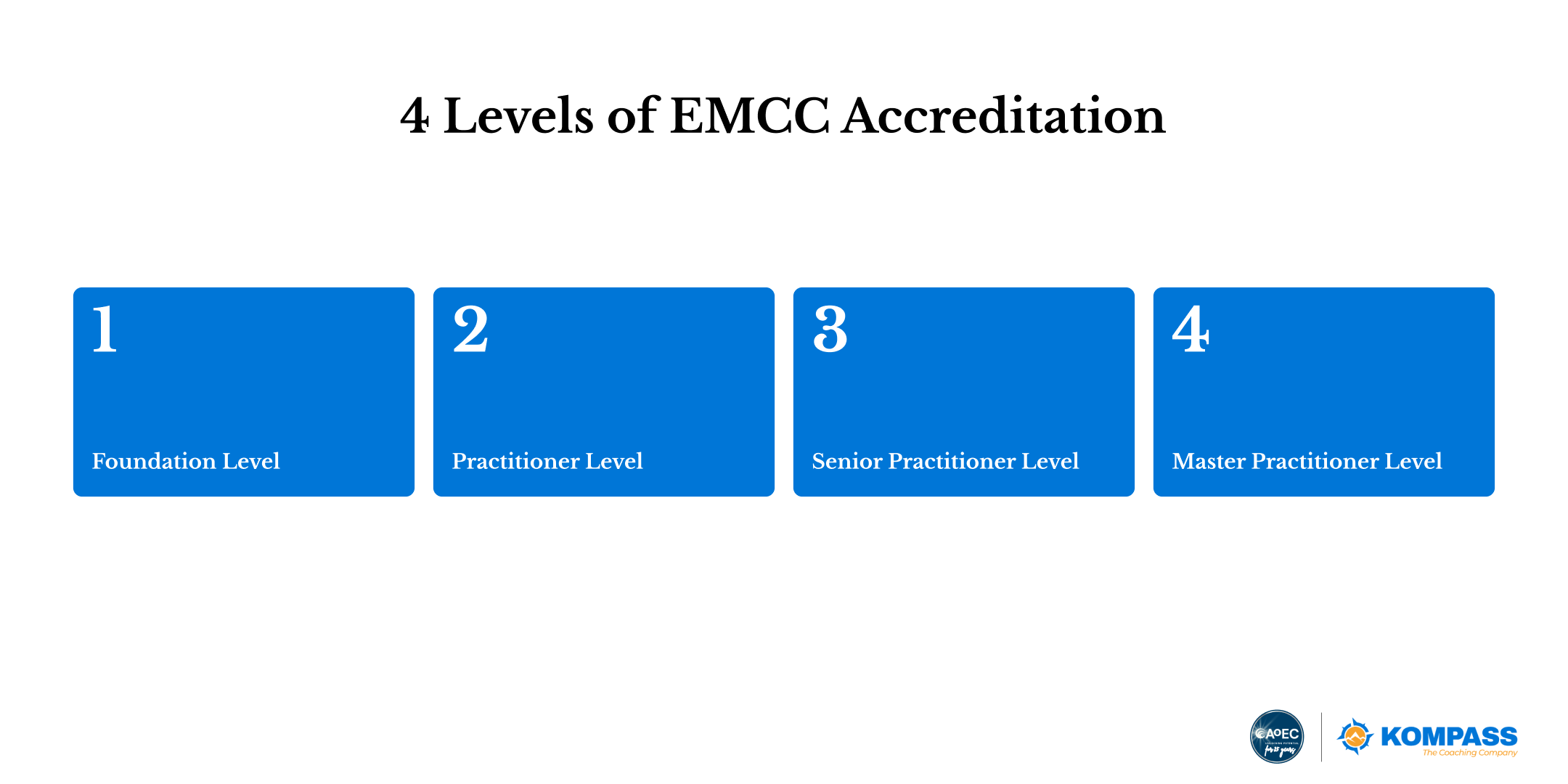The European Mentoring and Coaching Council (EMCC) is a globally recognised organisation that sets high professional standards for coaches and mentors. It provides a structured framework to ensure quality, accountability, and consistency in coaching practices. Achieving EMCC accreditation signifies that a coach has met rigorous competence, ethics, and ongoing professional development benchmarks.
For leadership coaches and professionals in the field, being an EMCC Accredited Coach demonstrates expertise and builds trust with clients and peers. It’s a mark of credibility that can elevate a coach’s career and enhance their impact.
This blog is designed to provide a clear and practical guide to EMCC accreditation. Whether you’re exploring its benefits, navigating the process, or seeking support to apply, this article covers everything you need to know about why it matters and how to achieve it.
What is EMCC Accreditation?
EMCC accreditation is a professional recognition awarded to coaches and mentors who meet high standards in their practice. It is issued by the European Mentoring and Coaching Council (EMCC), which promotes quality, ethical behaviour, and continuous improvement in the coaching industry. Accreditation involves assessing a coach’s skills, knowledge, and ability to adhere to professional guidelines.
EMCC accreditation is highly valued because it demonstrates a coach’s commitment to maintaining professional standards and ongoing development. It assures clients and employers that the coach is skilled, ethical, and reflective in their practice. In an industry where trust and credibility are crucial, EMCC accreditation sets professionals apart and builds confidence in their abilities. This recognition is particularly significant in leadership coaching, where expertise and accountability are essential.
Key Differences Between EMCC and ICF Accreditation
EMCC accreditation emphasises a reflective and holistic approach to coaching, assessing how coaches integrate learning and adapt to different client needs. It offers multiple accreditation levels based on experience and practice.
In contrast, becoming an ICF-certified coach strongly focuses on core coaching competencies and adherence to a standardised coaching model.
Both accreditations are respected globally, but EMCC offers flexibility and broader recognition across mentoring and coaching disciplines.
The Importance of EMCC Accreditation for Coaches
-
Gain Global Recognition
EMCC accreditation is respected worldwide, making it easier for coaches to establish credibility across borders. It signals a commitment to professional standards, which are highly valued by clients and organisations globally.
-
Enhance Your Coaching Skills
The EMCC accreditation process encourages self-reflection and ongoing professional development. This helps coaches refine their approach, deepen their understanding of client needs, and deliver more impactful sessions.
-
Build Client Trust
Clients are more likely to choose coaches with recognised qualifications. EMCC accreditation assures that a coach follows ethical practices and has proven expertise, making it easier to gain client confidence.
-
Advance Your Career
EMCC accreditation opens doors to new opportunities. It increases your visibility in the coaching community and can lead to collaborations, higher-paying roles, or invitations to work with prestigious organisations.
A Guide to the EMCC Accreditation Process
The EMCC accreditation process ensures that coaches meet professional standards and demonstrate competence in their field. It requires meeting specific criteria and preparing evidence of your skills.

Eligibility Requirements
To be eligible for EMCC accreditation, you need to satisfy the following requirements:
- Coaching Experience: A minimum number of documented coaching hours, depending on the level of accreditation you are applying for.
- Training and Qualifications: Completion of a recognised coaching or mentoring programme that aligns with EMCC’s professional standards.
- Continuous Professional Development (CPD): Evidence of regular learning and development activities to enhance your coaching practice.
- Mentoring or Supervision: Proof of regular mentoring or supervision to ensure accountability and growth.
Assessment Criteria
The assessment is based on EMCC’s competence framework, which evaluates key aspects of your coaching practice:
- Building Effective Relationships: Demonstrating your ability to establish trust and rapport with clients.
- Facilitating Learning and Development: Showcasing techniques that support client growth and goal achievement.
- Professional Knowledge and Skills: Evidence of your understanding of coaching principles and how you apply them in practice.
- Reflective Practice: Demonstrating self-awareness through examples of how you evaluate and improve your coaching approach.
- Adherence to Ethics: Prove that you operate within EMCC’s ethical guidelines and uphold professional integrity.
You’ll need to submit documentation such as client feedback, coaching logs, and reflective practice records as part of the assessment.
Tips for a Successful Application
A well-prepared application increases your chances of success. Here are practical steps to help you:
- Organise Your Evidence Early: Collect documents such as coaching logs, client testimonials, and CPD records well in advance.
- Understand the Competence Framework: Familiarise yourself with EMCC’s criteria to ensure your evidence meets their expectations.
- Seek Guidance: Consider working with a mentor or supervisor with EMCC accreditation experience. Their insights can help you refine your application.
- Be Thorough and Clear: Ensure your submission is complete and all evidence is clearly labelled and explained.
- Allocate Time for Reflection: Reflect on your coaching journey and include examples highlighting your growth and effectiveness.
Taking a systematic approach to the application process will help you present your skills and experience in the best possible way.
4 Levels of EMCC Accreditation Explained

1. Foundation Level
The Foundation Level is designed for coaches and mentors new to the field. It recognises those with basic coaching skills and limited practical experience. To achieve this level, you need to demonstrate a clear understanding of coaching principles and show evidence of applying these in a structured way. This is a good starting point for building confidence and gaining credibility as a beginner coach.
2. Practitioner Level
The Practitioner Level is for those with solid coaching skills and practical experience. Coaches at this level should understand coaching processes and demonstrate consistent, effective practice with clients. To achieve this accreditation, you must provide evidence of client work, reflective practice, and ongoing professional development. This level is ideal for coaches looking to establish themselves professionally.
3. Senior Practitioner Level
The Senior Practitioner Level is aimed at experienced coaches with advanced skills and a proven track record. This accreditation requires you to showcase complex coaching interventions and an ability to handle diverse client needs. You will also need to demonstrate leadership skills in coaching, such as mentoring less experienced coaches or contributing to professional development initiatives. This level highlights your ability to deliver high-quality coaching in demanding contexts.
4. Master Practitioner Level
The Master Practitioner Level is accredited for highly experienced coaches with significant expertise. It recognises those consistently delivering transformative coaching outcomes and contributing to the profession’s advancement. You must provide evidence of strategic impact, innovative practice, and thought leadership to achieve this level. This accreditation positions you as a leading expert and a trusted voice in the coaching industry.
Take the First Step Towards Becoming an EMCC Accredited Coach
Achieving EMCC accreditation is a powerful step in advancing your coaching career. It demonstrates your commitment to professional standards, helps you develop a growth mindset, and builds trust with clients and organisations. Whether you are just starting or aiming to refine your expertise, EMCC offers a clear pathway to achieving your goals.
If you’re ready to start your accreditation journey, Kompass is here to help. We offer personalised support, resources, and guidance tailored to your needs. Contact us today to take the next step and make your coaching practice stand out.

FAQs: Additional Questions About EMCC Accreditation
1. Is EMCC Accreditation Mandatory for Coaches?
No, EMCC accreditation is not mandatory, but it is highly recommended for coaches who want to establish credibility, demonstrate professionalism, and gain recognition in the coaching industry.
2. How Often Does EMCC Accreditation Need to Be Renewed?
EMCC accreditation is valid for five years. To renew, coaches must provide evidence of continuous professional development (CPD) and reflective practice during this period.
3. Can Coaches with No Prior Experience Apply for EMCC Accreditation?
Yes, new coaches can apply at the Foundation Level, which is designed for those just starting in their coaching journey. It focuses on basic skills and theoretical understanding.
4. Is EMCC Accreditation Recognised Internationally?
Yes, EMCC accreditation is recognised worldwide. It is a respected credential that enhances a coach’s reputation and supports international career opportunities.
5. How Long Does It Take to Get EMCC Accreditation?
The time depends on your current qualifications and experience. For example, preparing a Practitioner-level application might take a few months, while higher levels like Senior Practitioner could require longer preparation.







